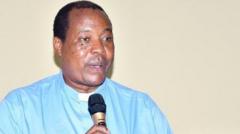As political tensions intensify ahead of the upcoming elections, Fr. Charles Kitima’s attack raises alarms regarding civic safety and freedom of expression in the country.
**Political Tensions Rise in Tanzania as Prominent Priest Attacked**

**Political Tensions Rise in Tanzania as Prominent Priest Attacked**
Tanzanian authorities face backlash following a violent assault on a prominent Catholic priest known for criticizing the government.
In a shocking incident reflecting the escalating political climate in Tanzania, Fr. Charles Kitima, a well-known Catholic priest and government critic, was brutally attacked recently. The assault occurred after he had attended a religious meeting, as he was ambushed in a restroom near his Dar es Salaam home by two assailants who struck him with a blunt force object. Police reported that Kitima sustained injuries and was subsequently hospitalized, where he is currently in stable condition.
Witness accounts revealed that moments before the attack, Fr. Kitima was engaged in conversation with several individuals, adding a layer of mystery to the incident. Eyewitnesses discovered him bleeding and in distress shortly after the attackers fled the scene. Authorities confirmed the detention of one suspect while investigations continue to uncover the motivations behind the brutal assault.
The attack has drawn significant condemnation from various sectors of society. Boniface Mwabukusi, the president of the Tanganyika Law Society, condemned the act as an attempt on the priest's life, and highlighted Fr. Kitima's message of courage to the Tanzanian populace: "we should not be afraid to pay the price for standing up for justice and fulfilling our duties to the country."
As Tanzania approaches general elections set for October, political tensions are escalating. Rights groups have expressed concern over diminishing civic space and the functioning of democracy. The opposition Chadema party's vice-chairman, John Heche, described the attack as detrimental to the nation’s image. The Legal and Human Rights Centre also denounced this "heinous act," stressing that it projects a negative portrayal of Tanzania to the world.
Fr. Kitima serves as the secretary-general of the Tanzania Episcopal Conference (TEC) and is revered for his vocal criticism of governmental policies and advocacy for human rights and democratic reforms. His assault comes just days after the Catholic Church publicly urged the government to address calls for electoral reform—a significant demand among opposition factions.
Leaders within the Christian community, which constitutes about 60% of Tanzania's population, are increasingly vocal regarding issues of justice and governance; however, their criticisms have provoked backlash from supporters of the ruling party, who are calling for religious leaders to refrain from participating in political discourse.
Attacks and kidnappings targeting government critics have surged in Tanzania over the past year, with numerous opposition leaders facing arrest, including Tundu Lissu, who has been charged with treason. Notably, such types of violence against religious figures have been rare in Tanzania’s recent history, heightening concerns regarding the environment for civic engagement.
As of now, police are still piecing together details of the attack on Fr. Kitima, and the government has yet to issue a statement regarding this alarming incident. The ongoing investigation will likely reveal more about the complexities surrounding political dissent and violence in Tanzania as the countdown to the country's elections continues.
Witness accounts revealed that moments before the attack, Fr. Kitima was engaged in conversation with several individuals, adding a layer of mystery to the incident. Eyewitnesses discovered him bleeding and in distress shortly after the attackers fled the scene. Authorities confirmed the detention of one suspect while investigations continue to uncover the motivations behind the brutal assault.
The attack has drawn significant condemnation from various sectors of society. Boniface Mwabukusi, the president of the Tanganyika Law Society, condemned the act as an attempt on the priest's life, and highlighted Fr. Kitima's message of courage to the Tanzanian populace: "we should not be afraid to pay the price for standing up for justice and fulfilling our duties to the country."
As Tanzania approaches general elections set for October, political tensions are escalating. Rights groups have expressed concern over diminishing civic space and the functioning of democracy. The opposition Chadema party's vice-chairman, John Heche, described the attack as detrimental to the nation’s image. The Legal and Human Rights Centre also denounced this "heinous act," stressing that it projects a negative portrayal of Tanzania to the world.
Fr. Kitima serves as the secretary-general of the Tanzania Episcopal Conference (TEC) and is revered for his vocal criticism of governmental policies and advocacy for human rights and democratic reforms. His assault comes just days after the Catholic Church publicly urged the government to address calls for electoral reform—a significant demand among opposition factions.
Leaders within the Christian community, which constitutes about 60% of Tanzania's population, are increasingly vocal regarding issues of justice and governance; however, their criticisms have provoked backlash from supporters of the ruling party, who are calling for religious leaders to refrain from participating in political discourse.
Attacks and kidnappings targeting government critics have surged in Tanzania over the past year, with numerous opposition leaders facing arrest, including Tundu Lissu, who has been charged with treason. Notably, such types of violence against religious figures have been rare in Tanzania’s recent history, heightening concerns regarding the environment for civic engagement.
As of now, police are still piecing together details of the attack on Fr. Kitima, and the government has yet to issue a statement regarding this alarming incident. The ongoing investigation will likely reveal more about the complexities surrounding political dissent and violence in Tanzania as the countdown to the country's elections continues.























